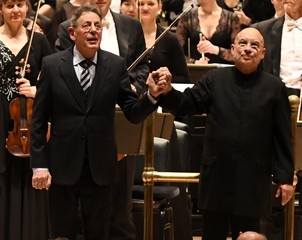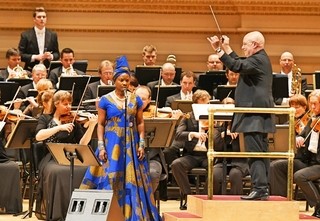|
Back
Honors to a Radiant Master New York
Issac Stern Auditorium,Carnegie Hall
01/31/2017 -
“In Celebration of Philip Glass’ 80th Birthday”:
Philip Glass: Days and Nights in Rocinha (New York Premiere) – Ifè: Three Yorùbá Songs – Symphony No. 11 (World Premiere)
Angélique Kidjo (Vocalist)
Bruckner Orchester Linz, Dennis Russell Davies (Conductor)

P. Glass, D. R. Davies at Carnegie Hall (© Pete Checchia)
Perhaps instead of the plain name “Glass” last night, one could rename the composer Monsieur Vitrail.
For indeed, the three works played by conductor Dennis Russell Davies was not heard “through a glass darkly”, but were transformed into a window of many colors, all darting from the mind of this prodigious prolific composers. They were iridescent, sparkling, radiant, sometimes repetitive (hey, it’s Philip Glass), but rarely dark.
And on this 80th birthday celebration, where Carnegie Hall was packed to the rafters, where the audience was wildly enthusiastic, and where the Honored Birthday Guest sat happily in the balcony, while his fondest conductor, Dennis Russell Davies offered three examples of Philip Glass at his most diverse.
I once asked a conductor the least favorite composer with whom he had to work. “Philip Glass,” he said without hesitation. Then continued, “Oh, I like the music. But I have nothing to do. I simply keep time, and the orchestra does the rest.”
That was several decades ago, and while the Philip Glass trademarks were unmistakable last night, any conductor who simply waved his wand would have encountered catastrophe.

A. Kidjo, D. R. Davies, Bruckner Orchester Linz (© Pete Checchia)
And nowhere was this better demonstrated than the second startling work, Ifè: Three Yorùbá Songs by the equally startling Benin-born Angélique Kidjo.
Ms. Kidjo breaks all vocal boundaries, winning Grammy awards, being listed as among the most influential people in Africa and collaborating with the best pop and “serious” composers, including Mr. Glass. In fact, when Mr. Glass heard the enchanting magical Creation myth from Ms. Kidjo’s Yorùbá people, the result was an absolutely electrifying version from three of the songs.
Ms. Kidjo’s low, fluid voice became ever more passionate, as the Glass melodies and rhythms become more and more evocative of the poems; the “Mother of the River”, the “Rainbow Snake”, the “Palm Wine Magic” (the latter reminiscent of Nigeria’s great novel, “The Palm Wine Drunkard”).
This was a different Philip Glass, not imitating African motifs but offering a narration, a story-telling, with Ms. Kidjo’s amplified voice offering the emotion. Her ending was unforgettable. Two words, perhaps repeating the English, “I praise you, praise you”, which in itself became an exaltation a Hosannah which needed no translation.
Before that was the New York premiere of Days and Nights in Rocinha, Glass’ memento of a Rio neighborhood where samba is the beat. It had to be related to Boléro, since again we had an exotic mesmeric beat, with a series of variations, rising and falling to the pulse of South American dancers. Not ending with Ravel’s sudden key modulation, but a more powerful repetitive percussive beat.
I confess that at first I was not entranced. Dennis Russell Davies is one of Mr. Glass’s prime conductors, but his “day job’ is music director of the Bruckner Orchester Linz, named for the composer’s birthplace. After hearing the Staatskapelle Berlin play seven of Bruckner’s nine symphonies last week, this orchestra seemed, unavoidably, a bit wobbly, without the brilliance of the Berlin ensemble. Yet within a few minutes, it became apparent that the Glass piece didn’t need that immaculate playing. Where Ms. Kidjo had worked with a religious celebration, this was a celebration of sensuosity, the pulse not pushing forward but giving room for extra beats, an extra measure breaking up the one melody, an additional percussion riff. Grabbing us by surprise, as if, had we been dancing, we would have been laughing at the “wrong” notes, the erratic measures.
Last night’s world premiere was Mr. Glass’s 11th Symphony. Where the first two works were vividly pictorial, we were back in abstract territory now. And to this listener, brilliant as the orchestration and moods, one kept remembering old themes, old repeating scales, the whirling strings, the ominous chords in the tuba, the brass consorts, the cellos.
More and more, I have relished Mr. Glass’ operas, where his music pushes the drama, and the drama becomes part of the music, where–as in Ifè: Three Yorùbá Songs, he turns poetry into ritual.
This 11th Symphony was composed by a master. A master who confidently knows his orchestra and his conductor (did I detect some Brucknerian chords in the movements?). “Movement 1” was basically a pulsing sonata, “Movement 2” was slower, but never actually slow. Again, the rhythmical instensity insisted that it go on without a stop.
“Movement 3” could have been a percussion sonata. Beginning with a high school football-team march, going onto a fugue with woodblocks and later snare drum, the five percussionists led the way into a riotous festival of drums and strings, of the Glass arpeggios we know so well, and the predicable ecstatic finale.
For as he goes into is ninth decade, Mr. Glass continues his endless inventions. Frequently electrifying, or strikingly lucid. Or, as in his Symphony last night, a remembrance of songs past. Glorious songs too. And obviously endless pulsing throbbing accentuations to enrich us in the future.
Harry Rolnick
|